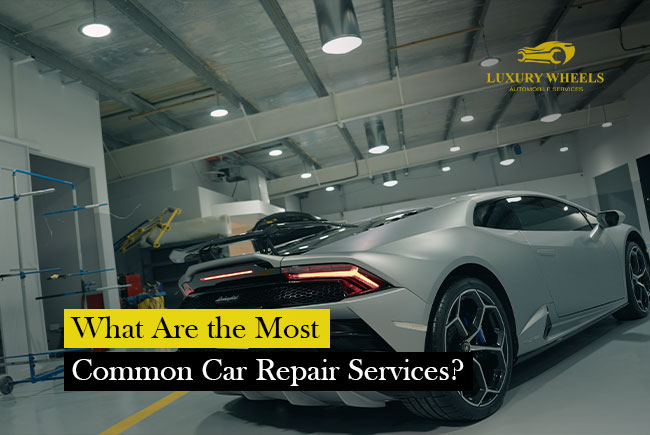
Table of Contents
- Introduction
- Engine Repairs
- Brake Repairs
- Transmission Repairs
- Tire Services
- Battery Replacement and Charging
- Air Conditioning and Heating Systems
- Suspension and Steering Repairs
- Exhaust System Repairs
- Oil Changes and Fluid Checks
- Electrical System Repairs
- Timing Belt and Chain Repairs
- Fuel System Repairs
- Windshield and Glass Repairs
- Common DIY Car Maintenance
- Conclusion
- Frequently Asked Questions (FAQs)
Car repairs are a part of vehicle ownership that no one can avoid for long. As cars age and experience wear and tear, specific issues crop up more frequently than others. From engine troubles to brake failures, car owners must stay informed about common repairs to maintain vehicle safety, efficiency, and longevity. This guide will explore some of the most common car repair services.
Transmission Repairs
Transmission Fluid and Its Role in Car Performance
Your car's transmission transfers power from the engine to the wheels. Transmission problems can lead to serious performance issues, such as slipping gears, difficulty shifting, or strange noises. Transmission fluid keeps the system lubricated and functioning smoothly, so regular fluid checks and changes are vital.
Symptoms of a Failing Transmission
A failing transmission may present symptoms like slipping gears, delayed shifting, or strange noises while the car runs. Ignoring these signs can lead to expensive repairs or a complete transmission replacement, so early intervention is key.
Tire Services
Tire Rotation, Balancing, and Alignment
Your tires endure constant wear, so regular maintenance is necessary to ensure even wear and optimal performance. Tire rotation, balancing, and alignment services prevent uneven tire wear, reduce vibrations, and provide a smoother ride.
When to Replace Tires
If your tires show signs of tread wear, such as visible grooves or bald spots, it's time to replace them. Worn-out tires can be dangerous and lead to poor handling or tire blowouts.
Battery Replacement and Charging
Signs Your Car Battery Needs Replacement
A car battery typically lasts 3–5 years, but its performance can decline due to extreme weather or wear. If your car is slow to start, the lights are dim, or the battery warning light on your dashboard illuminates, your battery might be nearing the end of its life.
Proper Battery Maintenance to Avoid Issues
To extend your car battery's life, ensure it's properly charged and cleaned. Regularly check for corrosion on the terminals and replace old batteries before they fail to avoid being stranded.
Air Conditioning and Heating Systems
How Car Air Conditioning Works
Your car's air conditioning and heating systems are responsible for maintaining a comfortable interior climate. Over time, the A/C may fail to blow cold air, or the heating system may become less effective.
Common A/C and Heating System Problems
Common problems include low refrigerant levels, clogged filters, or a broken compressor. Keeping an eye on your air conditioning and heating system can ensure you stay comfortable, regardless of the weather.
Suspension and Steering Repairs
Signs of Suspension Problems
The suspension system includes springs, shocks, and struts that help control the car's handling and comfort. Symptoms of suspension problems include bumpy rides, uneven tire wear, or difficulty steering. If you notice these signs, getting your suspension checked is essential.
Standard Steering Issues and Solutions
Power steering failure, difficulty turning the wheel, and unusual noises when turning the car are common steering issues. These problems are often caused by low-power steering fluid or a malfunctioning steering pump.
Exhaust System Repairs
How the Exhaust System Affects Your Car's Performance
The exhaust system reduces harmful vehicle emissions and helps control noise levels. A well-maintained exhaust system ensures your car is both environmentally friendly and quieter.
Common Exhaust System Failures and How to Fix Them
Exhaust system issues include muffler holes, leaks, and catalytic converter failure. These problems can result in loud noises, decreased fuel efficiency, and harmful emissions.
Oil Changes and Fluid Checks
Why Regular Oil Changes are Essential for Your Engine's Health
Oil changes are one of the most basic but crucial car maintenance tasks. Regular oil changes ensure your engine is properly lubricated, preventing overheating and friction.
Types of Fluids That Need to Be Checked Regularly
Aside from oil, other fluids like brake fluid, transmission fluid, and coolant must be checked regularly to ensure your car operates smoothly and safely.
Electrical System Repairs
Common Car Electrical System Failures
Electrical issues can arise from a faulty alternator, blown fuses, or wiring problems. These issues can cause the car to fail to start or lead to malfunctioning lights and accessories.
How to Troubleshoot Electrical Issues
If your electrical system starts malfunctioning, it must be diagnosed by a professional to pinpoint whether the issue lies in the battery, alternator, or fuses.
Timing Belt and Chain Repairs
What Happens When a Timing Belt Fails?
The timing belt ensures the engine's valves open and close in sync with the pistons. If the timing belt snaps, it can lead to severe engine damage. Regular inspections and timely replacement can prevent catastrophic failures.
Signs You Need a Timing Belt Replacement
A ticking noise from the engine, difficulty starting the car, or engine misfires are signs that your timing belt may need replacement.
Fuel System Repairs
How to Tell if Your Fuel System Needs Repair
Fuel system problems can result in poor fuel efficiency, stalling, or difficulty starting. Issues like clogged fuel injectors, a malfunctioning fuel pump, or a dirty fuel filter may be the culprit.
What Happens When the Fuel System Fails
A failing fuel system can cause engine misfires, rough idling, and even complete engine failure. Regular fuel system inspections can prevent costly repairs.
Windshield and Glass Repairs
Common Windshield and Glass Issues
Cracked windshields or broken windows are common problems due to accidents, weather conditions, or road debris.
How to Deal with Cracks, Chips, and Breakages
Small chips and cracks can be repaired, but larger damages require complete replacement. Timely repairs can prevent further damage and ensure your car remains safe.
Common DIY Car Maintenance
Simple Car Maintenance Tasks You Can Do Yourself
Changing the oil, replacing air filters, checking tire pressure, and cleaning the windshield are tasks many car owners can handle. Regular DIY maintenance can help keep your car in good working order.
When to Seek Professional Help for Car Repairs
While DIY repairs are often sufficient for fundamental issues, a professional mechanic should handle anything beyond routine maintenance to avoid causing more damage.
Conclusion
Regular maintenance and timely repairs are key to extending the life of your vehicle and ensuring safe driving. Understanding the most common car repair services and how to address them can save you time, money, and stress. Always consult a professional mechanic when in doubt, and keep your car in top shape for years.





